About:Anita
Posts by Anita :
- Tackling loneliness for people who are housebound, Posted on , in Uncategorized
- Grove Neighbourhood Centre Folk Art Group, Posted on , in Blog Entry
- Celebrating Volunteers’ Week, Posted on , in Blog Entry
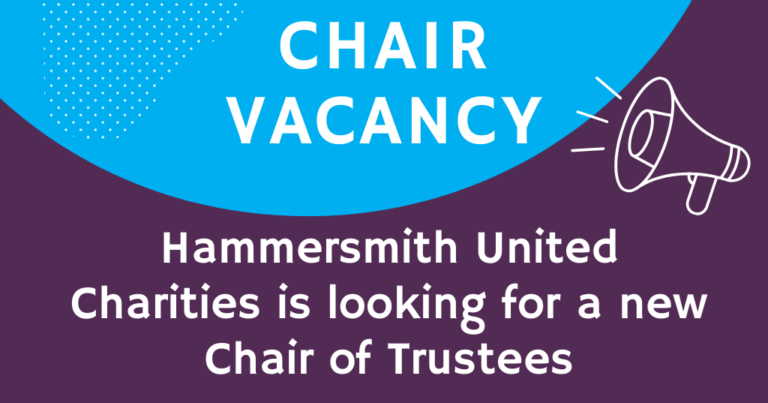
Could you be our next Chair of Trustees?
We are looking for an exceptional individual who shares our values and aspirations for Hammersmith. If you have the vision, leadership skills, and a genuine connection to our mission, we would be delighted to hear from you.
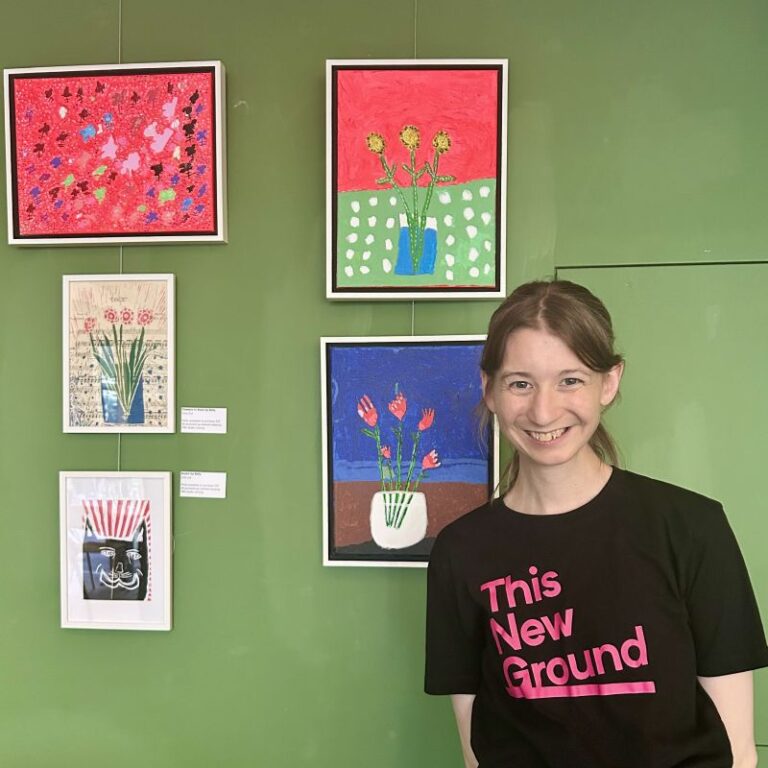
Art and music can often feel inaccessible to people who have a learning disability. This New Ground is helping to change that.
While This New Ground originally started as a choir, it has since grown into a community interest community (CIC) delivering a diverse and ambitious programme of creative engagement – elevating the voices and artistic talents of people who are neurodivergent or who have a learning disability.
The CIC is headed by co-founders Lucy Groenewoud and Nathalie Russell-Clarke. It has two hubs, one in London and one in Portsmouth. Lucy explains, “Nathalie started the choir because she recognised there was a real gap in provision for adults over 25 who have a learning disability. Over the years, this has developed into a thriving creative hub. More recently, we have gone on to open an art studio in the Creighton Centre.”
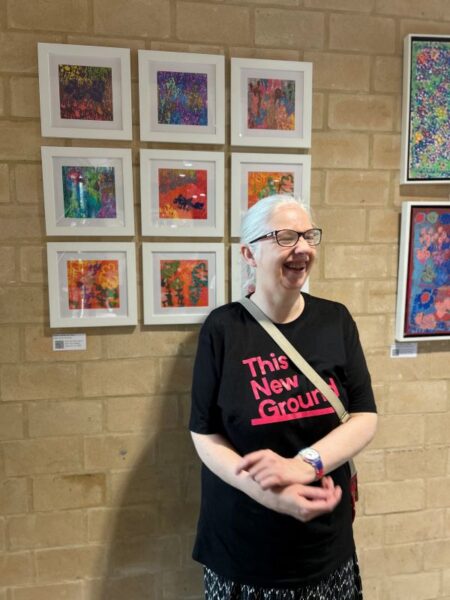
Lucy shares, “There’s a long-standing perception that art created by people with a learning disability belongs in community centres. It’s often seen as craft, not art. But thankfully, things are changing. Slowly but surely, cultural perceptions are shifting, and the arts sector is beginning to recognise the value, depth and complexity of work by neurodivergent artists and artists with a learning disability.
“A powerful example is Nnena Kalu, a phenomenal artist with a learning disability, who has just been nominated for the Turner Prize – one of the most prestigious awards in contemporary art. Her recognition marks an important moment of visibility and validation for many others still fighting to be seen.
“We’re working to challenge outdated and negative perceptions around learning disability and creativity. Our goal is to get the work made by artists in This New Ground seen, valued and celebrated by wider audiences.
“One exciting step in that journey is our new partnership with Lush, who are transforming artwork by some of our artists into beautiful Knot Wraps and greetings cards. For the artists, it’s more than just visibility – it’s the powerful realisation that, ‘Actually, this is something I could have a career in.’ It’s about recognition, opportunity and a sense of real creative ownership.”
Research by Mencap shows that just 26.7% of people with a learning disability are currently in paid employment. This New Ground is able to offer two avenues for paid work. Firstly, it helps artists to sell their work. Secondly, it hires them to support businesses who want to make their communications more accessible.
Lucy says, “We believe in the voices and the talents of people with a learning disability and of those who are neurodivergent. For us, it’s really important that people have the opportunity to experience paid work and being in a workplace.”

Along with creativity and employment skills, there are many other benefits felt by This New Ground participants. Lucy says, “Isolation is a really big factor for a lot of the people we work with. A lot of them don’t have support, they live independently and they aren’t working, so our sessions are a social lifeline where they can develop relationships. Singing and creating art also increases confidence and gives people a real sense of achievement. Creative spaces like ours offer community, expression and connection in ways that are truly transformative.”
Martin, a participant at This New Ground’s art group, says, “It’s about getting out and about and meeting new people and being artistic. I didn’t think I had any art skills, but clearly I do, and I have grown to enjoy art.”
Lucy and Nathalie want to ensure that people with a learning disability can help to guide and steer the CIC. Lucy shares, “We’re working to diversify our leadership and have people with lived experience on our leadership team.”
The Hammersmith choir is now peer-led, with a keyboardist and drama facilitator on hand to offer support.
“Quite often people will come in and say they don’t have enough money to buy food,” says Lucy. The Creighton Centre has been able to organise food vouchers, and Hammersmith United Charities has provided This New Ground with a grant to help cover running costs.
Thanks to grant funding and volunteer support, the CIC is able to keep the art club and choir free for participants. At a time when many are facing deep financial hardship, this means access to creativity, connection and community remains open to everyone.
Lucy says, “We’re incredibly grateful for the funding we receive; we wouldn’t be able to operate without it. It enables the whole group to take part in a vital weekly social activity – something that makes a real difference to people’s lives.”
This New Ground activities are held at the Creighton Centre, 378 Lillie Road, London SW6 7PH.
TNG Studio: Open Tuesdays, please email lucy@thisnewground.com if you’d like to join a supported studio session.
Art group: Tuesdays, 1–2.30pm
Singing group: Tuesdays, 3–4pm
The groups are free to attend. Please email lucy@thisnewground.com if you’d like to join.
Work by This New Ground artists is being exhibited at Sands End Arts & Community Centre until 31st July 2025.
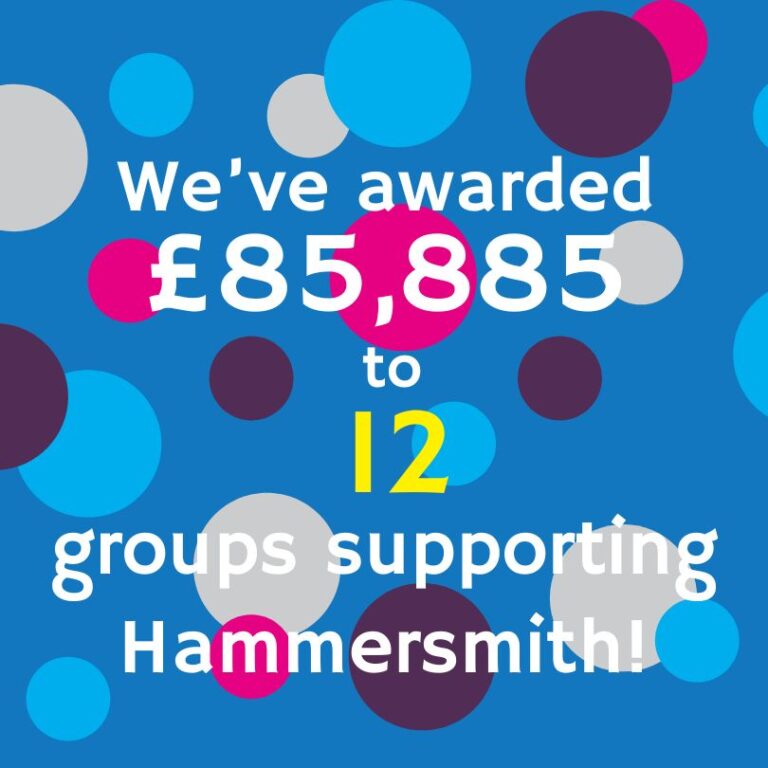
12 groups have been awarded grants totalling £85,885.
Hammersmith is a vibrant, welcoming area with numerous charities and other local organisations making a positive difference to people’s lives, day in, day out. We’ve been supporting these grassroots causes for many years, by awarding Community Grants to groups that make a tangible impact to people’s lives, including those working to alleviate poverty, enrich children’s lives, and support some of the most vulnerable people in Hammersmith.
Our most recent grant round in February 2025 saw 12 groups awarded grants totalling £85,885. The full list of grant holders is as follows:
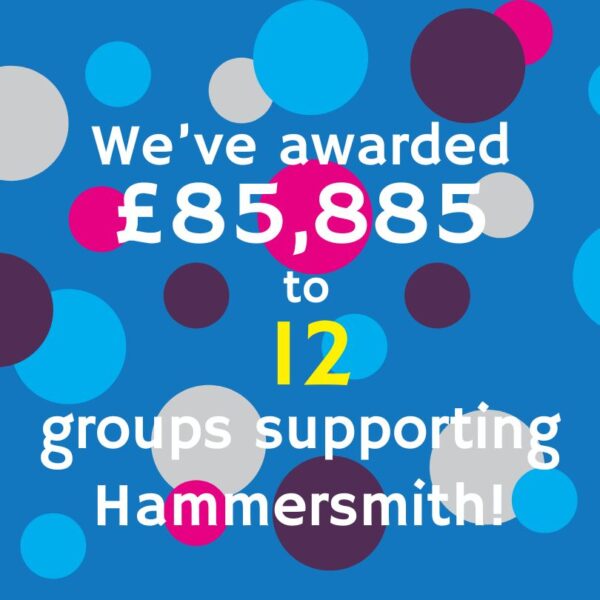 John Betts Primary School: £12,200
John Betts Primary School: £12,200The grant will enable up to 28 children to receive play-based therapy, helping them to thrive at school and beyond.
The 13-week Strengthening Families programme funded by our grant will help 15 inmates at Wormwood Scrubs to strengthen ties with their families.
Age UK’s Shopping Service helps housebound and/or disabled older people to retain their independence. You can read more about the service in our case study.
The Kulan Foundation provides a range of services for people from a global majority background. The charity is putting its grant towards staffing and premises costs so that it can continue its popular homework club, parent workshops and other projects.
The grant will fund the energy costs of Dads House’s food bank, lunch club and family law clinic, as well as providing essential supplies for single fathers and their families.
With the help of our grant, The Reanella Trust is able to offer mental health counselling, mentoring and group activities for Black children who are disabled or who have bipolar. Read our case study here.
The WILDE Foundation is using its grant to help it run ‘Women Heal’ workshops, which support women to manage grief, trauma and mental ill-health, and to run local activities such as its Writers Festival.
Hammersmith and Fulham Foodbank relies on volunteers to create food parcels and support people in crisis. Our grant will enable the charity to train volunteers in areas such as ‘conversations with vulnerable people’ and ‘mental health awareness’.
The grant will fund massage and reflexology sessions for people who may otherwise not be able to access them.
Solidarity Sports works with disadvantaged children who are recovering from complex trauma. The focus is on transformational play-based activities. Our grant will help to fund equipment and other expenses for children under 5.
The grant will fund performance art by and for disabled artists in the borough, to be performed during the JOY festival.
The Grove Parent and Toddler Group gives adults and children a fun, supportive place to come together each week. The grant will be put towards staffing and location costs. Read our case study here.
We’re particularly keen to hear from smaller, local organisations in our area of benefit, which have a strong connection to their community and a working knowledge of the local area. Your project can be one-off or ongoing. What interests us most is the difference you’ll make to the local people most in need.
Please complete our Eligibility Quiz before applying, and then contact us at grants@hamunitedcharities.com to tell us about your project. We like to talk to applicants before you apply so that we can get a better understanding of what you’re doing and answer any questions you may have.

Women Aid and Empowerment brings people together through Zumba.
From park runs to salsa classes, group exercise is a great opportunity to socialise, get fit and have fun. However, monthly membership fees can make exercise unaffordable for people on a low income. What’s more, as Hanna Teffera shares, “Many people find going to the gym difficult for other reasons, including subtle racism, ageism, body shaming, or the pressure to keep up with high-intensity classes that are too challenging for people with mobility difficulties or reduced fitness.”
 To address these barriers, Hanna partnered with two other women to set up Women Aid and Empowerment. She explains, “We decided to set up our own community interest company after hearing that a popular programme, which offered free fitness classes for women in White City, was closing. We realised that most of the women in our community are economically disadvantaged and would struggle to afford to join a gym. They were very upset about losing the free classes as this was often their only opportunity to exercise and socialise with other people.”
To address these barriers, Hanna partnered with two other women to set up Women Aid and Empowerment. She explains, “We decided to set up our own community interest company after hearing that a popular programme, which offered free fitness classes for women in White City, was closing. We realised that most of the women in our community are economically disadvantaged and would struggle to afford to join a gym. They were very upset about losing the free classes as this was often their only opportunity to exercise and socialise with other people.”
The CIC now runs classes in Zumba, chair-based yoga and chair-based exercise at three locations in Hammersmith & Fulham, including White City Community Centre. Unlike most exercise classes, these ones are free and welcome people of all abilities. Hanna is a professional fitness instructor so leads the classes. One participant, Eunice, says, “Hanna’s chair-based exercises have been a game-changer for me! Her classes are not only accessible but also incredibly effective. I’ve noticed significant improvements in my strength and flexibility, all while having a great time.”
Crucially, the classes also give people the chance to socialise afterwards. Hanna shares, “I have a lot of retired and widowed people attending. Many used to be active but had become ill or disabled. Some had become isolated in their home. Since coming to the class, their health has improved and so has their loneliness, as they feel that they have somewhere to go. They talk after class, meet up with each other and feel more connected with their community.
“For instance, one lady was very lonely. All her children had left home so she was by herself. Because of our class, she has found a best friend. Another lady became very depressed after losing her son. Doing exercise and seeing other people has really helped her.”
Participants have also reported other health benefits, including improved sleep and reduced stress.
One regular participant, Joanna, shares, “Hanna’s exercise sessions are a fantastic way to socialise and meet new people! Her warm and welcoming approach creates a friendly atmosphere where everyone feels included. Not only do we get a great workout, but we also have the opportunity to connect and build friendships. I’ve loved getting to know others while staying active, and Hanna’s positive energy makes every session enjoyable. It’s the perfect blend of fitness and fun.”
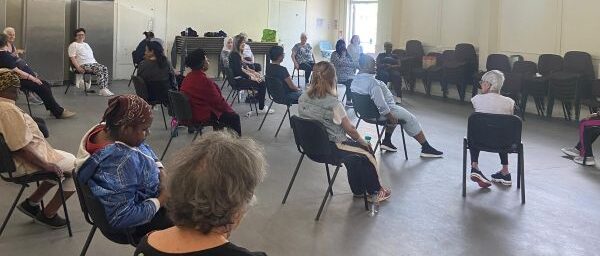
Women Aid and Empowerment runs Zumba, chair-based yoga and chair-based exercise classes at:
For more details and to book, visit https://waelondon.org/ or contact Hanna on h.teffera@yahoo.co.uk, 07383 117676.
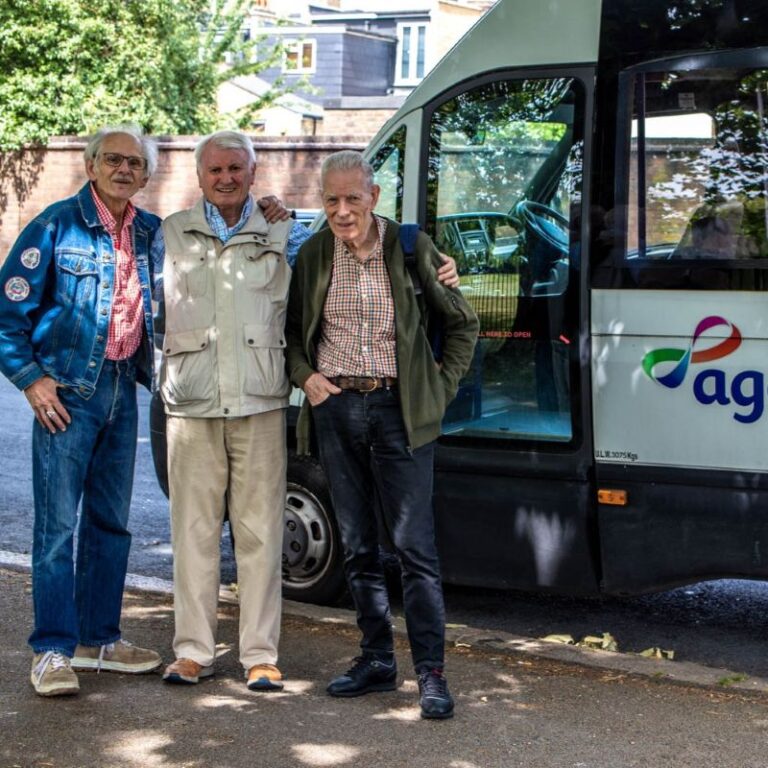
Age UK Hammersmith & Fulham’s Shopping Service help older people to retain their independence and social life.
According to Age UK, almost one million older people in the UK often feel lonely. Without the social structure of a workplace or chatter at the school gate, it can be all too easy to go for days without speaking to another person.
Age UK Hammersmith & Fulham helps to bring older people together. From a lunch club costing just £2, to bingo, a music club, arts & crafts activities and yoga, there are a wide range of weekly activities to choose from.
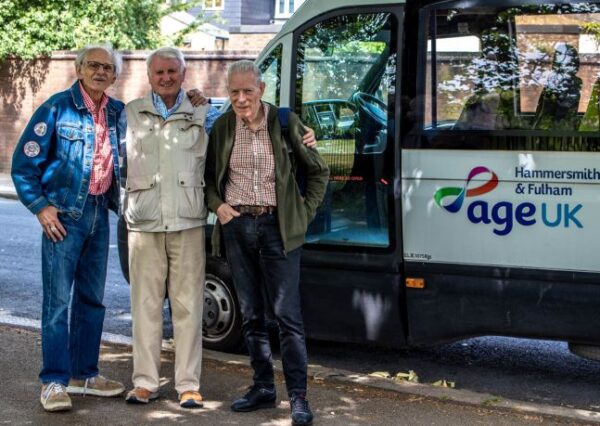
Loneliness can be particularly difficult for people with mobility issues who struggle to leave their house so can’t reach the charity’s activity centre. For these people, the charity’s Shopping Service provides a crucial lifeline, helping them to retain their independence and meet up with friends.
Jordan, the minibus driver, and Noel, a volunteer, pick clients up from their homes and take them to the supermarket. Some clients are accompanied by a care worker or family member, but most are happy to travel on their own as Jordan and Noel are on hand to help with wheelchairs and can offer assistance in the supermarket if people need it. Many of the charity’s clients would otherwise be unable to do their own shopping, and for some, this could be the only time they leave the house. As one client, John, shares, “Getting out for that morning has been the highlight of my week.”
Richard Ashe is the Fundraising Manager at Age UK Hammersmith & Fulham. He says, “The Shopping Service is vital for our housebound and disabled clients. Some of these clients used to come to our activity centre. They’d come for lunch or a yoga lesson for example, but bit by bit, their mobility has deteriorated, or other circumstances have come up, which means they now can’t attend. The Shopping Service gives clients a bit of normality back.”
Groups of around eight clients travel to the supermarket together at the same time each fortnight. As a result, they get to know one another. As Richard says, “It creates a little community. Everyone’s chatting. It seamlessly blends social interaction with a core life activity.”
One client, Michael, shares, “I feel like I’m part of a group! One week I didn’t feel well enough to go shopping; the next, everyone said they had missed me. How lovely is that?”
Most weeks, the minibus heads to the ASDA Superstore, so people can buy clothes and other essentials as well as food. However, the service is guided by the clients. Richard shares, “Sometimes they want to do something different so will go to Sainsburys or Tesco, particularly if one of them needs something in particular.” The charity also surveys its clients regularly to check that they’re happy with the service and whether they want to change anything.
If a client needs extra support, for example because their carer is away, the charity can usually arrange for another volunteer to come along. Richard has accompanied them a couple of times himself.
The Shopping Service costs just £3 as it’s subsidised by Age UK Hammersmith & Fulham, with the help of a grant from Hammersmith United Charities.
Age UK Hammersmith & Fulham also offers a befriending service. The charity’s Volunteering Manager aims to match clients with volunteers who have similar interests. Richard says, “Some of them will go out to the theatre together. One pair sit down to have a good game of chess every week.”
In Hammersmith and Fulham, 40% of people over 65 live alone, and 25% have a long-term health problem. For those who need support, even if it’s just a friendly chat or the chance to meet new people, Age UK Hammersmith & Fulham provides a crucial service.
If you want to find out more about the Shopping Service or volunteering, visit www.ageuk.org.uk/hammersmithandfulham
"*" indicates required fields
This site uses cookies: Find out more.
| Cookie | Duration | Description |
|---|---|---|
| cookielawinfo-checkbox-analytics | 11 months | This cookie is set by GDPR Cookie Consent plugin. The cookie is used to store the user consent for the cookies in the category "Analytics". |
| cookielawinfo-checkbox-functional | 11 months | The cookie is set by GDPR cookie consent to record the user consent for the cookies in the category "Functional". |
| cookielawinfo-checkbox-necessary | 11 months | This cookie is set by GDPR Cookie Consent plugin. The cookies is used to store the user consent for the cookies in the category "Necessary". |
| cookielawinfo-checkbox-others | 11 months | This cookie is set by GDPR Cookie Consent plugin. The cookie is used to store the user consent for the cookies in the category "Other. |
| cookielawinfo-checkbox-performance | 11 months | This cookie is set by GDPR Cookie Consent plugin. The cookie is used to store the user consent for the cookies in the category "Performance". |
| viewed_cookie_policy | 11 months | The cookie is set by the GDPR Cookie Consent plugin and is used to store whether or not user has consented to the use of cookies. It does not store any personal data. |
| Cookie | Duration | Description |
|---|---|---|
| CONSENT | 16 years 4 months | These cookies are set via embedded youtube-videos. They register anonymous statistical data on for example how many times the video is displayed and what settings are used for playback.No sensitive data is collected unless you log in to your google account, in that case your choices are linked with your account, for example if you click “like” on a video. |
| Cookie | Duration | Description |
|---|---|---|
| IDE | 1 year 24 days | Google DoubleClick IDE cookies are used to store information about how the user uses the website to present them with relevant ads and according to the user profile. |
| test_cookie | 15 minutes | The test_cookie is set by doubleclick.net and is used to determine if the user's browser supports cookies. |
| VISITOR_INFO1_LIVE | 5 months 27 days | A cookie set by YouTube to measure bandwidth that determines whether the user gets the new or old player interface. |
| YSC | session | YSC cookie is set by Youtube and is used to track the views of embedded videos on Youtube pages. |
| yt-remote-connected-devices | never | These cookies are set via embedded youtube-videos. |
| yt-remote-device-id | never | These cookies are set via embedded youtube-videos. |
| yt.innertube::nextId | never | These cookies are set via embedded youtube-videos. |
| yt.innertube::requests | never | These cookies are set via embedded youtube-videos. |